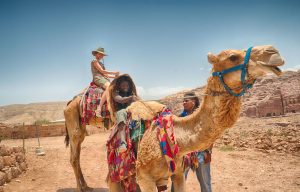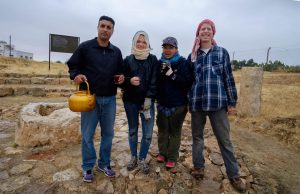Field School

Students riding camels at Petra

Enjoying tea on the Tell
2022 Field School Dates: 10 June to 11 July, 2022
Optional cultural preservation opportunity in Petra with Sela
The Jordan Field School offers opportunities for field-based training in the country of Jordan for students of anthropology, archaeology, architecture, art history, communication and digital media, community development, documentary film, global studies, landscape design, history, and religion. The field school is an undertaking of the Institute of Archaeology at Andrews University (Michigan, USA) in collaboration with the School of Behavioral and Social Sciences, the School of Architecture and Interior Design, and the departments of Religion and Biblical Languages, Visual Art, Communication and Design, and Sustainable Agriculture.
The School also collaborates with faculty and students from other universities and has a long-standing association with the Madaba Plains Project (of which our Hisban project was a founding member), Calvin University (formerly Calvin College in Michigan, USA), and the Department of Islamic Studies at the University of Bonn (Germany). In-country partners include the Department of Antiquities of Jordan, Sela for Vocational Training and Protection of Cultural Heritage, the Hisban Women’s Association, the Hisban Cultural Association, and various other individual supporters of the project in the town of Hisban.
Current excavations at the site have focused on four areas: the Islamic village on its western slope; in and around the four towers of the citadel; the massive Iron Age reservoir (perhaps one of “the pools of Heshbon”); and restoration of the foundations and mosaics in one of the Byzantine churches. Examples of the types of outreach activities that our field school has been doing in the local community include the following:
- Worked with teachers in the Hisban schools to develop a lesson plan for teaching local K-12 children about the history of Hisban. Children thus learn about the history of their own forbearers even as they also get a glimpse of the civilizations that have left their mark in the archaeological layers of Hisban.
- Worked with local leadership to establish the Hisban Cultural Association as a means to give voice to the local population in planning for touristic development of the site.
- Hired on a year-around basis local caretakers or site stewards whose responsibility is to keep an eye on the site and report any vandalism or behavioral problems in the site.
- Completed a site management plan providing detailed instructions on how to maintain in-situ archaeological exhibits, signage, interpretive paths and platforms, and the park landscape.
- Established, together with the American Schools of Oriental Research, the Lawrence T. Geraty Community Archaeology Endowment to generate funds to pilot innovative projects to help protect archaeological sites in Jordan
- Initiated together with Sela for Vocational Training and Protection of Cultural Heritage and the Hisban Women’s Association an outreach to visitors and tourists featuring local foods and hospitality. Income from this outreach benefits local families even as it also generates modest income for the support of maintaining the archaeological site.
- This past year we also initiated the Hisban Online Publication Platform (HOPP). Its aim is to facilitate on-line collaboration by our team of researchers across international borders on acquisition, curation, analysis, and visualization of data generated by our field school teams. The platform will also vastly improve how we share with the public our results, including an interactive 3-D animation of the unfolding story of Hisban. Linked to this animation will be a series of short documentary films in English and Arabic that will explain the dominant cultural and historical forces behind the changes depicted in the 3-D moving images of Hisban. These films will be produced by Field School faculty and students in close cooperation with staff from the Department of Antiquities of Jordan and students from various universities in Jordan. We are currently applying for funding for this initiative from the National Endowment for the Humanities and from other US based foundations.
For more information about the Jordan Field School contact or email one of our faculty at the following email addresses: jordanfieldschool@andrews.edu; labianca@andrews.edu; chrisj@andrews.edu; rroot@andrews.edu; hornmuseum@andrews.edu.